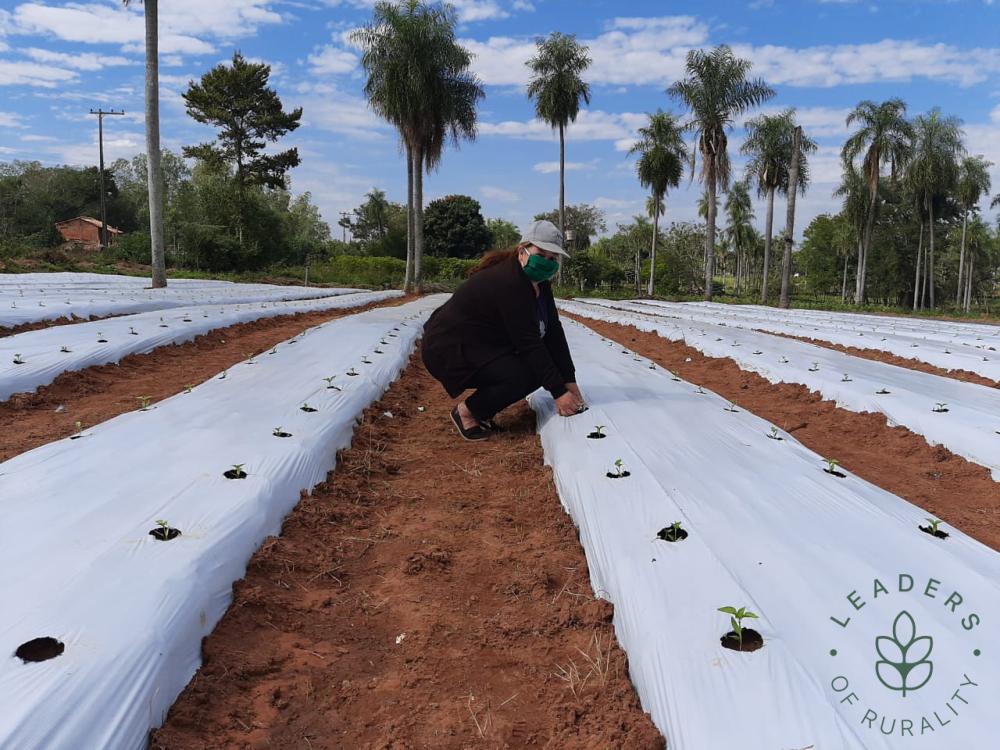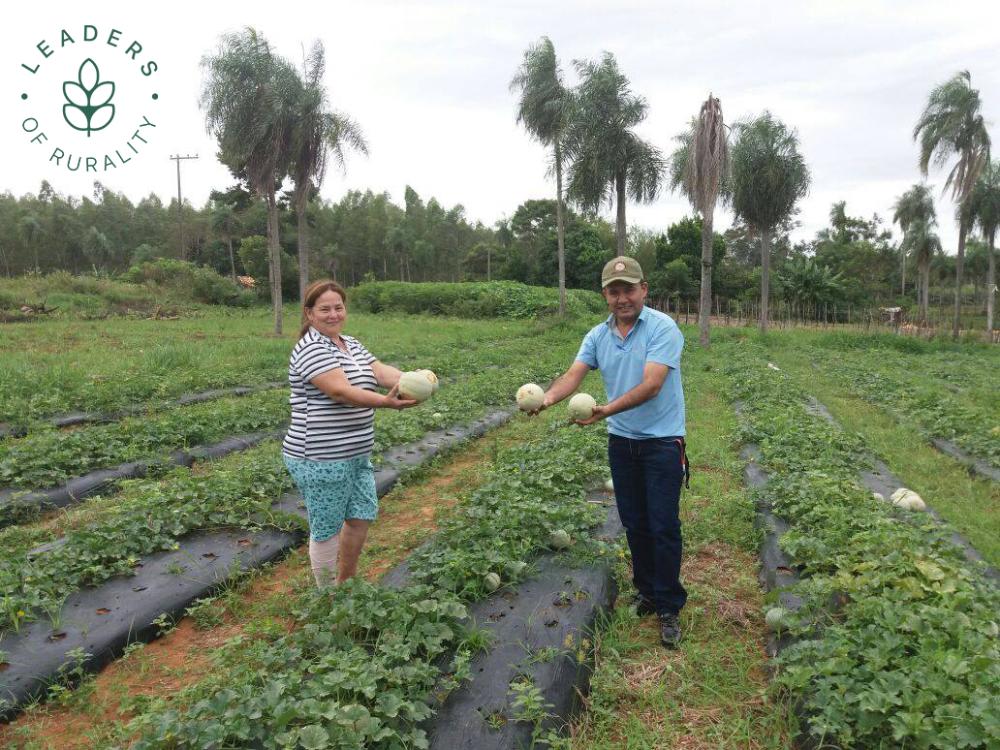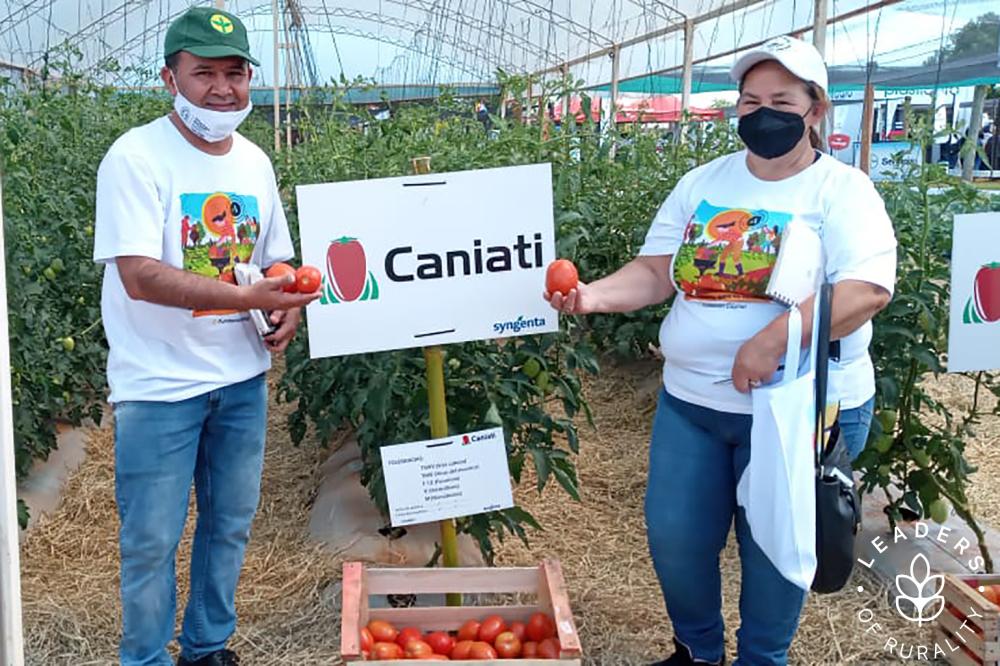The “Soul of Rurality” award recognizes her efforts to raise awareness among farmers of the municipality of Itá of the importance of associative undertakings as a means of achieving a better quality of life.

Asunción, 23 June 2022 (IICA). Paraguayan family farmer Rosalina Jarolin Fernández, who works to encourage small-scale farmers to establish associations, directly market their products and, in turn, improve their income, was named “Leader of Rurality” of the Americas by the Inter-American Institute for Cooperation on Agriculture (IICA).
The “Soul of Rurality” award recognizes her efforts to raise awareness among farmers of the municipality of Itá of the importance of associative undertakings as a means of achieving a better quality of life.
IICA recognizes Leaders of Rurality in the Americas to reward and bring visibility to those who play the irreplaceable dual role of being guarantors of food and nutrition security, while also being guardians of the planet’s biodiversity through production under any circumstances. These are men and women leaving their mark and making a difference in the rural areas of Latin America and the Caribbean.
Rosalina grew up in a family of rice farmers, but from a young age she turned to dressmaking. Family circumstances brought her back to agriculture, a passion she soon rediscovered.
At present, she leads the Curupicayty Association, made up of 53 farmers, 24 of whom are women. She dedicates every morning to farm work before traveling 38 kilometers to the Paraguayan capital of Asunción, where she runs the organization’s fruit and vegetable stand. She also seeks to instill a love of agriculture among youth in Itá.
IICA considers agriculture to be an instrument for peace and the integration of all peoples, and is working alongside its 34 Delegations in the Americas to select the #LeadersofRurality.
The seamstress who put down her scissors to rediscover her calling in agriculture
Although she grew up on a farm in the Paraguayan municipality of Itá, where she helped her parents with farm work, Rosalina Jarolin did not always dedicate her time to food production. Instead, she learned the dressmaking trade at a very young age and was a seamstress for many years. However, unexpected life circumstances brought her back to the land and to agricultural production.
Having returned to agriculture, she now feels that she has rediscovered her true calling. Not only because she produces fruits such as cantaloupe and strawberries and vegetables such as tomatoes, peppers, squash and cucumbers, but also because she is a true leader in her community. Rosalina is one of the founders of the Curupicayty Association. With her support, family farmers from Itá organized themselves to better market their products and achieve a better quality of life for their families.
“As a woman, I play a double role, because I do the household chores and take care of my family, even though my four children are now grown up. I also work in the vegetable garden. A love of agriculture runs in my blood and that is why I keep producing and looking for the best way to collectively market our products. We have received significant support from both IICA and the Ministry of Agriculture and Livestock of Paraguay, which have provided us with training and tools to do better. But what makes me the happiest is the fact that there are young people in our association

She especially values women’s participation in agriculture and in collective social life: “Before, women in our community were housewives, dedicated only to household chores and childrearing, which is why they had no income of their own. At present, many of them are involved in production and are independent. Us women must not let different roles get taken away from us, and we must seize opportunities. I really enjoy working with other women”.
Rosalina’s day begins at 5 a.m., when she gets up, drinks some mate and heads to her five-hectare farm – less than half of which she uses to grow fruits and vegetables. There, Rosalina checks on the various crops to see what needs to be done. She enjoys being in contact with the land so much, that she’s on the farm even on Sundays.
Her day is long. At dusk, she travels 38 kilometers from Itá to Asunción, the capital of Paraguay, to run the Curupicayty Association’s stand at the Mercado Central de Abasto, the wholesale market that supplies fresh food to stores throughout the country on a daily basis.
From seamstress to farmer
Rosalina grew up in a humble rice farming family. The nine siblings helped their parents on the farm, carrying out low-tech tasks requiring a great deal of effort. Her parents encouraged her to learn dressmaking, so that she could earn a living as a seamstress and avoid having to make so many sacrifices. Once she was married, however, her husband suffered an accident that prevented him from continuing to work in the field, so she drew up the courage to put down her scissors and pick up gardening tools, working ceaselessly because she had school age children at the time.
She launched her agricultural production with some strawberry seedlings that she received from the Ministry of Agriculture, and she hasn’t stopped since. She focused on fruit and vegetable production, but quickly realized that family farmers needed to partner together to get ahead.
“We started holding meetings to discuss how to resolve the various issues we faced. Marketing our tomatoes, for instance, was particularly difficult because of the import of products from Brazil and Argentina. Oftentimes, we ended up throwing away our crops because we could not sell them. So, we created the Association, which, since 2006, has been selling the food we grow Asunción’s wholesale market”, says Rosalina.

Together with a colleague, she decided to run the sales stand of the Association, which was initially made up of 17 producers. Today, the organization brings together 53 farmers, 24 of whom are women, and is now legally recognized and up to date with its taxes.
“Being able to directly sell our food, without any intermediaries, is very important. But not all farmers are able to go to the market to run the stand, and some lack the necessary charisma to be traders. You have to know how to deal with customers and you have to be patient and perseverant. If us farmers don’t unite and organize ourselves, it is the middleman who makes the greatest profit”, she says.
Rosalina is also particularly concerned about the future of farming and the role of youth. She dedicates a lot of her time to working with youth, listening to their needs and concerns, and sharing her experiences with them.
“I always tell them to enjoy working the land and to value the people who work in agriculture, because they are the ones who put food on our tables every day. Many young people leave the countryside behind to study in cities and never return. I believe that those of us who come from the countryside should encourage them to love rural life, regardless of their profession”, she continues.
Rosalina acknowledges the key importance of creating opportunities for rural dwellers: “Small-scale farmers often struggle to be profitable and live well; that is why it is important that all countries have institutions that work to provide farmers with tools, so that they may improve their quality of life. With that support, youth will be willing to work the land and to contribute to saving family farming”.
More information:
Institutional Communication Division.
comunicacion.institucional@iica.int
Photo gallery











